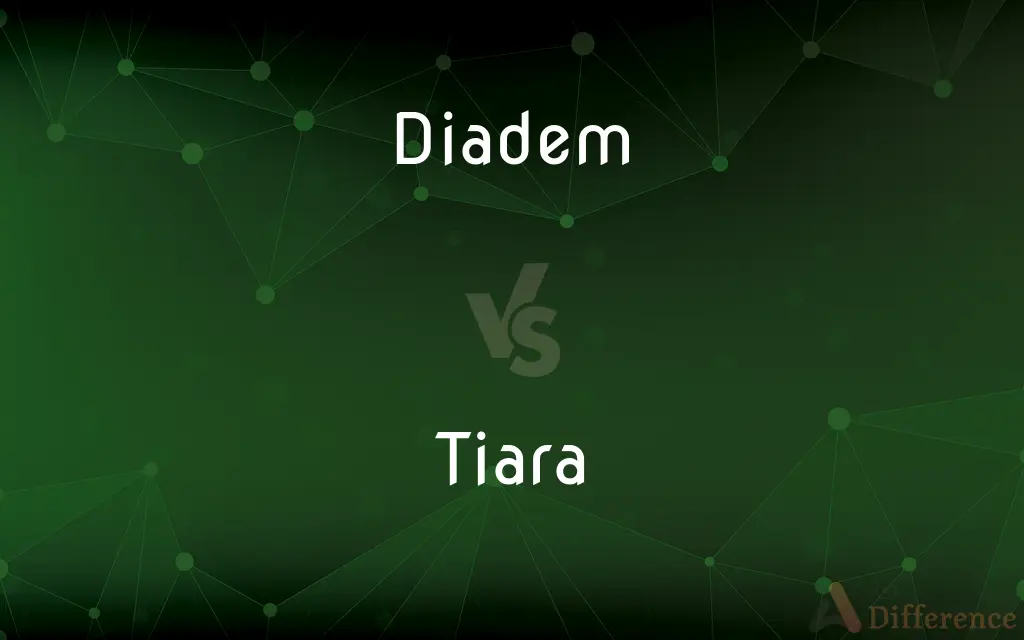Diadem vs. Tiara — What's the Difference?
By Tayyaba Rehman — Updated on October 23, 2023
A diadem is a type of ornamental headband signifying royalty or authority, while a tiara is a jeweled, semi-circular crown often worn by women on formal occasions.

Difference Between Diadem and Tiara
Table of Contents
ADVERTISEMENT
Key Differences
A diadem historically symbolizes power and authority. Worn around the forehead, it often takes the form of a cloth or metal band, often adorned with jewels. In contrast, a tiara is specifically a jeweled, semi-circular headpiece that typically graces the heads of women during special events or ceremonies, especially in Western cultures.
The diadem has ancient origins and is frequently seen in artifacts from ancient civilizations. Rulers from different cultures wore diadems as symbols of their authority. Tiaras, on the other hand, have associations with European nobility and are commonly linked to princesses and queens, especially in contemporary contexts.
While both diadems and tiaras serve ornamental purposes, the contexts in which they are worn can differ. A diadem might have been worn by both genders in ancient times to signify status. The tiara, however, is predominantly a feminine accessory, often associated with bridal wear or royalty in modern times.
The design and materials used for diadems can be varied. They can be simple bands or more elaborate constructs with precious metals and stones. Tiaras are usually more intricate, adorned with gems, pearls, and other precious materials, emphasizing elegance and luxury.
Both diadems and tiaras have cultural and historical significance. While the diadem can be traced back to ancient civilizations like Egypt and Persia, the tiara has more recent roots in European royalty and aristocracy, becoming symbols of grace and aristocratic beauty.
ADVERTISEMENT
Comparison Chart
Basic Definition
An ornamental headband.
A jeweled, semi-circular crown.
Historical Usage
Worn by rulers in ancient civilizations.
Associated with European nobility.
Gender Association
Worn by both genders historically.
Predominantly feminine.
Design
Can be a simple band or ornate with jewels.
Typically intricate with gems and pearls.
Symbolism
Represents power and authority.
Symbolizes grace, beauty, and nobility.
Compare with Definitions
Diadem
A cloth or metal band worn around the forehead.
The priestess wore a diadem as a mark of her high status.
Tiara
A jeweled, semi-circular crown worn on formal occasions.
The princess looked stunning with her diamond-studded tiara.
Diadem
A decorative band, often jeweled, worn by people of significance.
The artifacts from the excavation included a beautifully preserved diadem.
Tiara
A feminine headpiece associated with royalty and brides.
For her wedding, she chose a delicate tiara to complete her look.
Diadem
A regal accessory signifying power and authority.
In the mural, the leader was depicted with a diadem, indicating his leadership.
Tiara
An ornate accessory symbolizing grace and aristocratic beauty.
The tiara she wore was an heirloom, passed down through generations.
Diadem
A historical symbol of rulership in many ancient cultures.
Historians found references to diadems in ancient texts, highlighting their importance.
Tiara
A decorative semi-circular band worn on the head, often made of precious materials.
The exhibit showcased various tiaras from different eras of fashion.
Diadem
A diadem is a type of crown, specifically an ornamental headband worn by monarchs and others as a badge of royalty.
Tiara
A tiara (from Latin: tiara, from Ancient Greek: τιάρα) is a jeweled, ornamental crown traditionally worn by women. It is worn during formal occasions, particularly if the dress code is white tie.
Diadem
A crown worn as a sign of royalty.
Tiara
An ornamental, often jeweled, crownlike semicircle worn on the head, especially by women on formal occasions.
Diadem
Royal power or dignity.
Tiara
The triple crown historically worn by the pope, especially at his coronation ceremony, and still used heraldically as a symbol of the papacy.
Diadem
To adorn with or as if with a diadem.
Tiara
The papal crown.
Diadem
An ornamental headband worn as a badge of royalty.
Tiara
An ornamental coronet.
Diadem
A crown.
Tiara
A form of headdress worn by the ancient Persians. According to Xenophon, the royal tiara was encircled with a diadem, and was high and erect, while those of the people were flexible, or had rims turned over.
Diadem
Regal power; sovereignty; empire—considered as symbolized by the crown.
Tiara
The pope's triple crown. It was at first a round, high cap, but was afterward encompassed with a crown, subsequently with a second, and finally with a third. Fig.: The papal dignity.
Diadem
(heraldry) An arch rising from the rim of a crown (rarely also of a coronet), and uniting with others over its centre.
Tiara
A crown-like jewelled headdress worn by women on formal occasions
Diadem
To adorn with a diadem; to crown.
Tiara
A representation of nobility, especially in European contexts.
In the royal portrait, the queen's tiara was the highlight.
Diadem
Originally, an ornamental head band or fillet, worn by Eastern monarchs as a badge of royalty; hence (later), also, a crown, in general.
Diadem
Regal power; sovereignty; empire; - considered as symbolized by the crown.
Diadem
An arch rising from the rim of a crown (rarely also of a coronet), and uniting with others over its center.
Diadem
To adorn with a diadem; to crown.
Not so, when diadem'd with rays divine.
To terminate the evil,To diadem the right.
Diadem
An ornamental jewelled headdress signifying sovereignty
Diadem
An ornamental headband worn as a symbol of sovereignty.
The ancient king's portrait showcased a golden diadem adorned with emeralds.
Common Curiosities
Can men wear diadems?
Historically, men, especially rulers, wore diadems as symbols of authority.
Why are tiaras commonly associated with weddings?
Tiaras symbolize grace and beauty, making them a popular choice for brides wanting to feel like royalty.
Is a diadem exclusive to royalty?
Historically, diadems were often associated with rulers, but they could also be worn by others of high status.
Why do beauty pageant winners wear tiaras?
Tiaras symbolize victory, beauty, and grace, making them fitting for pageant winners.
Is there a cultural significance to diadems?
Yes, diadems have cultural and historical significance in many civilizations, symbolizing power and authority.
Are tiaras still popular today?
Yes, especially in contexts like weddings, beauty pageants, and royal events.
Can a tiara be considered a type of diadem?
Yes, a tiara can be viewed as a specific, ornate type of diadem.
Are tiaras worn only by women?
Tiaras are predominantly associated with women, especially in modern contexts like bridal wear and royalty.
Does a diadem always have jewels?
No, a diadem can be a simple band or more ornate with jewels, depending on the culture and era.
Is the term "crown" synonymous with "tiara"?
Not exactly. While both are headpieces, a crown is usually full-circled and symbolizes absolute authority, while a tiara is semi-circular and more ornamental.
Do all members of royalty wear tiaras?
Not always. The wearing of tiaras is often reserved for specific occasions and might be restricted to certain ranks within royalty.
Were diadems worn in ceremonies or daily?
It varied by culture, but diadems could be worn for both ceremonial purposes and as everyday symbols of authority.
How do you choose between a diadem and a tiara for an event?
It depends on the context and desired look. For a touch of royalty or bridal elegance, a tiara is apt. For historical reenactments or to symbolize authority, a diadem might be more appropriate.
How did the diadem evolve over time?
From simple cloth bands in ancient times, diadems evolved to be made of metals and adorned with jewels, reflecting the wearer's status.
Can a diadem be made of cloth?
Yes, historically, some diadems were made of cloth, especially in ancient cultures.
Share Your Discovery

Previous Comparison
Sundown vs. Sunset
Next Comparison
Realize vs. RecognizeAuthor Spotlight
Written by
Tayyaba RehmanTayyaba Rehman is a distinguished writer, currently serving as a primary contributor to askdifference.com. As a researcher in semantics and etymology, Tayyaba's passion for the complexity of languages and their distinctions has found a perfect home on the platform. Tayyaba delves into the intricacies of language, distinguishing between commonly confused words and phrases, thereby providing clarity for readers worldwide.













































